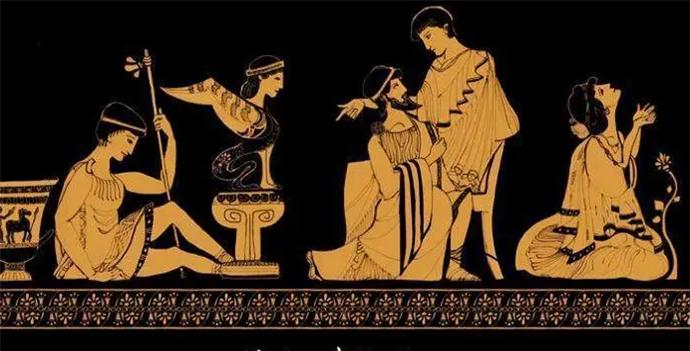The King of Oedipus is a play written by the ancient Greek writer Sophocles. The drama "King Oedipus" is based on greek myths and legends about Oedipus killing his father and marrying his mother. He fought against fate step by step, and in the end it was difficult to escape the clutches of fate, unconsciously killing his father and marrying his mother, committing a major crime.
The King of Oedipus is a play written by the ancient Greek writer Sophocles. The drama "King Oedipus", based on greek myths and legends about Oedipus killing his father and marrying his mother, shows the typical Greek tragic conflict - the conflict between man and fate.

Oedipus was the son of King Laius of Thebes and Queen Iocaster, an oracle received by the king and queen after asking for a blessing from the Temple of the Sun in Delphi, and when King Oedipus grew up, he would kill his father and marry his mother. In order to avoid bad luck, the king ordered his servants to throw the baby into the mountain forest outside the city, and the servant saw the cute baby boy in the mountain forest, and gave the baby boy to the Corinthians. Oedipus became the adopted son of king Corinth.
When he grew up, Oedipus received the oracle that he would "kill his father and marry his mother" and left Corinth. At a fork in the road, a horse-drawn carriage was encountered, and the two sides got into an argument and killed an old man by mistake. He came to the kingdom of Biss, subdued the Sphinx, was proclaimed king, and married a widow. Later, when the plague enveloped the whole city of Thebes, God said that the murderer of the former king of the kingdom must be found before the plague could be stopped. After being tracked down, he is the murderer. He blinded himself and exiled himself.
In ancient Greece, limited to the knowledge of the scientific level, people believed that there was an irresistible force that dominated fate and could not be liberated. Thus the protagonists and gods or heroes in ancient Greek tragedies actively fought against the unchangeable fate, and most of them ended in failure, but the light emitted by the struggle between man and fate was great and dazzling. The tragedy "Oedipus The King" is a typical tragic masterpiece of the ancient Greek period, and it is also the highest interpretation of the tragedy of fate.
Sphinx, the Sphinx-faced banshee, repeatedly recited a riddle: What animal sometimes has four feet, sometimes two feet, sometimes three feet, and the feet are the weakest at most; but anyone who cannot guess the riddle and wants to enter and exit the city gate will be swallowed by her. Dipus later guessed the correct answer, and the mystery was "man". Sphinx was so ashamed that he jumped off a cliff and died. Egypt also has sphinxes, but they are derived from Egyptian myths and legends, and they were built by Pharaoh Regidev based on his father Khufu.
In psychology, the concept of "Oedipus complex", which comes from the research of Freud, the founder of psychoanalysis, believes that in the early stage of sexual development of childhood, there will be love and same-sex rejection of the opposite sex among parents, and he named the phenomenon of boys falling in love with their mothers and rejecting their fathers "Oedipus complex", that is, "father-killing Oedipus complex", and girls, conversely, the corresponding concept is "Oedipus complex". However, most children will naturally emerge from the "Oedipus period" as they grow up.
Oedipus is a typical tragic figure, the tragic hero's personal strong will, heroic behavior and political ideals and the conflict with fate, showing the inevitable defeat and destruction of the hero in the mysterious struggle of the disparity of power. Everything he did was righteous, but inevitably plunged into tragedy. Thus, King Oedipus was considered by the ancient Greek thinker Aristotle to be a "perfect tragedy."